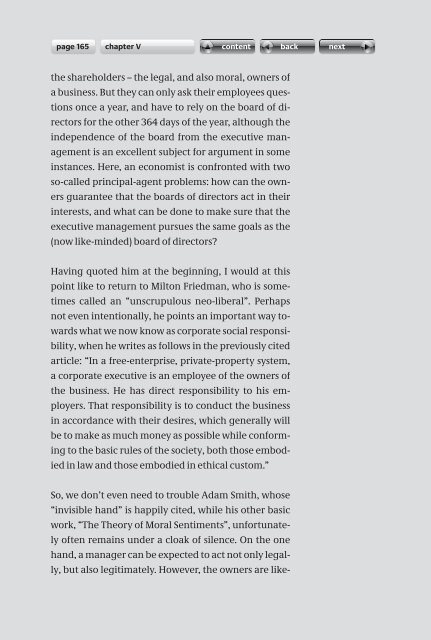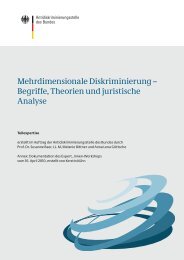Download (PDF,6 MB) - Antidiskriminierungsstelle
Download (PDF,6 MB) - Antidiskriminierungsstelle
Download (PDF,6 MB) - Antidiskriminierungsstelle
Sie wollen auch ein ePaper? Erhöhen Sie die Reichweite Ihrer Titel.
YUMPU macht aus Druck-PDFs automatisch weboptimierte ePaper, die Google liebt.
page 165 chapter V<br />
the shareholders – the legal, and also moral, owners of<br />
a business. But they can only ask their employees questions<br />
once a year, and have to rely on the board of directors<br />
for the other 364 days of the year, although the<br />
independence of the board from the executive management<br />
is an excellent subject for argument in some<br />
instances. Here, an economist is confronted with two<br />
so-called principal-agent problems: how can the owners<br />
guarantee that the boards of directors act in their<br />
interests, and what can be done to make sure that the<br />
executive management pursues the same goals as the<br />
(now like-minded) board of directors?<br />
Having quoted him at the beginning, I would at this<br />
point like to return to Milton Friedman, who is sometimes<br />
called an “unscrupulous neo-liberal”. Perhaps<br />
not even intentionally, he points an important way towards<br />
what we now know as corporate social responsibility,<br />
when he writes as follows in the previously cited<br />
article: “In a free-enterprise, private-property system,<br />
a corporate executive is an employee of the owners of<br />
the business. He has direct responsibility to his employers.<br />
That responsibility is to conduct the business<br />
in accordance with their desires, which generally will<br />
be to make as much money as possible while conforming<br />
to the basic rules of the society, both those embodied<br />
in law and those embodied in ethical custom.”<br />
So, we don’t even need to trouble Adam Smith, whose<br />
“invisible hand” is happily cited, while his other basic<br />
work, “The Theory of Moral Sentiments”, unfortunately<br />
often remains under a cloak of silence. On the one<br />
hand, a manager can be expected to act not only legally,<br />
but also legitimately. However, the owners are like-









